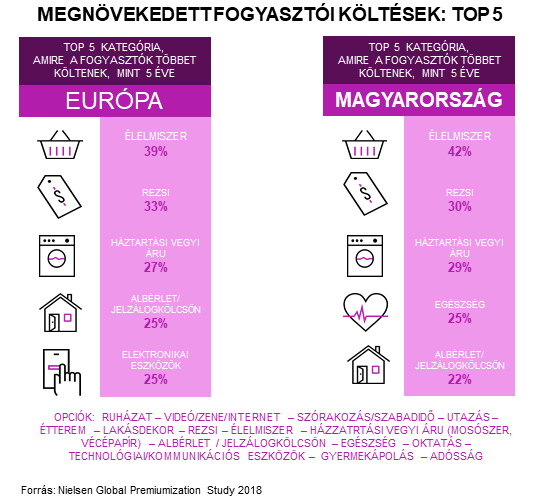44 out of 100 Hungarians describe their financial situation as comfortable

Nearly half (46%) of Hungarians believe they are financially better off than they were five years ago, which runs rings around the European average (37%). Globally 58 out of 100 consumers are more optimistic about their financial situation than back in 2014. In Europe, Romanians are the most positive about the improvement of their financial situation (61%), while Italians are the most pessimistic: only 17% stated they feel financially better off, according to a recent Nielsen report that reveals consumers’ sentiment towards their financial situations covering 64 markets around the world.
Global Nielsen study Changing Consumer Prosperity reveals general optimism, particularly in the region of Asia Pacific, with 70% of consumers feeling more positive than five years ago, followed by Africa and the Middle East (52%) and Latin America (50%). Consumers in developed markets are less optimistic; with Europe manifesting the worst result (37%).
Only 2% of Hungarians say they are able to spend freely, which is just one fifth of the European average and well below the global average (15%).
44 out of 100 Hungarian consumers describe their financial situation as comfortable (compared to 42 in Europe), although more than half of the respondents (54%) in Hungary say they are only able to cover their basic costs of living (vs 48% in Europe, and 32% globally).
“It’s interesting to note that while many consumers are feeling more financially stable than they did in the past, this does not necessarily translates as reckless spending” said Ágnes Szűcs-Villányi, Managing Director, Nielsen Hungary.
“Among Hungarian consumers price awareness, good value for money and generally low prices are still key factors when it comes to shopping. Retail landscape is undergoing a shift which transforms consumer behavior that reflects in their spending and categories they are looking for.”
The retail landscape benefited the most from the financial surplus: 42 out of 100 Hungarian consumers say they are spending more on groceries than they did 5 years ago.
Nearly one third of respondents state they are spending more money on household goods and cosmetics.
In addition, more money is spent on utilities and rent and mortgage are more expensive, respondents say.

The average European consumer spends more on groceries (+39%), utilities (+33%), household goods (+27%), rent/mortgage (+25%) and technology/communication (+25%).
[box type=”info”] The Nielsen Changing Consumer Prosperity report presents consumers’ sentiment towards their financial situations, their purchasing behaviour and impact on spending over time. It reveals consumer spending dynamics by regions covering 64 markets, including the top categories consumers are spending more on, along with top categories where consumers are willing to pay a premium. The insights will assist retailers and manufacturers in understanding consumer attitude in future spending and positioning products based on the opportunities that lie in premium and value segments in FMCG.[/box]
Source: Nielsen







